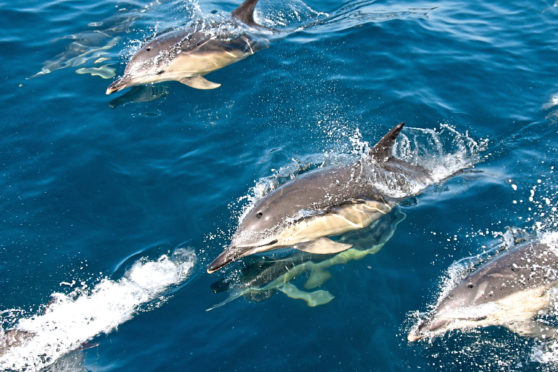Scottish salmon farmers have vowed to avoid using acoustic technology deemed as being potentially harmful to dolphins, porpoises, whales or other marine mammals.
The Scottish Salmon Producers’ Organisation (SSPO) said yesterday the industry will no longer use these acoustic deterrent devices (Adds) to protect fish from seal predation.
Adds are used by a number of marine sectors, including offshore construction and engineering, as well as salmon farmers to deter marine mammals from installations, and to protect animals, people and infrastructure.
They are part of the toolkit for managing predation by seals, in conjunction with other deterrent technologies and innovations, including anti-predation netting, seal blinds and new net tensioning methods.
According to SSPO, fish farmers in Scotland have a moral and legal responsibility to protect their stocks.
But the only circumstances where they will use Adds in future is where they comply with both Marine Scotland and US Marine Mammal Protection Act requirements, and operators have been provided with evidence from suppliers of the devices’ compliance.
The move coincides with new legislation requiring licences for work which may disturb or injure protected species.
Salmon farmers are awaiting guidance from the Scottish Government and US on the use of predation devices.
SSPO sustainability director Anne Anderson said: “Scottish salmon farmers are not using any acoustic deterrent devices that may have been considered to endanger cetaceans such as dolphins, porpoises and whales.
“All devices the sector does not have total confidence in, with regards to the harming of protected species, have been turned off and removed from the marine environment.
“It is critical, however that farmers have deterrents available to protect their livestock from seal predation.
“As such the Scottish salmon farming sector is committed to, where necessary, only using acoustic devices that have been scientifically proven to be compliant with the US Marine Mammals Protection Act.”
She added: “We call on Marine Scotland to work with the sector to develop a science-led approach which enables the use of deterrent devices, and supports research and innovation in this area to ensure farmers can continue to deploy these tools, which play a useful role in managing seal predation and improving animal welfare.
“Scotland’s salmon farmers are committed to farming in the most responsible way. This announcement illustrates our commitment to long-term sustainability.”
Adds use underwater transducers to create a temporary sound fence around a pen or farm. They can use random frequency sweeps and tones to unsettle approaching animals or produce sound at specific frequencies and volumes to cause discomfort to an approaching seal.
New-generation Adds have been developed to use different frequencies and volumes to help deter seals, while better safeguarding cetaceans.
Scottish salmon farmers are no longer allowed to shoot seals as a last resort in the protection of livestock, following a change in the law introduced on January 31.
